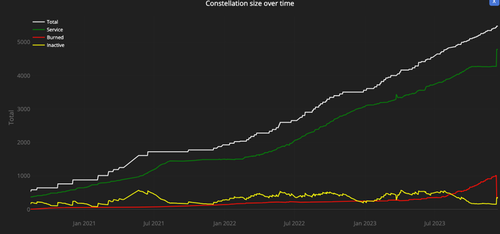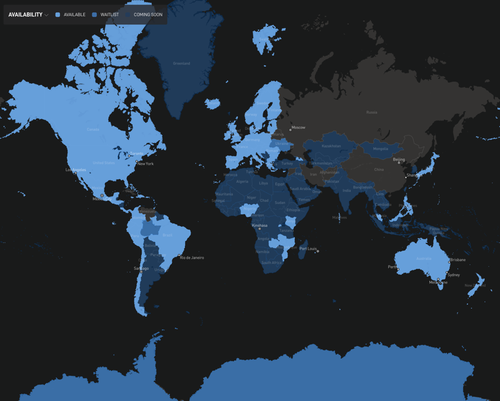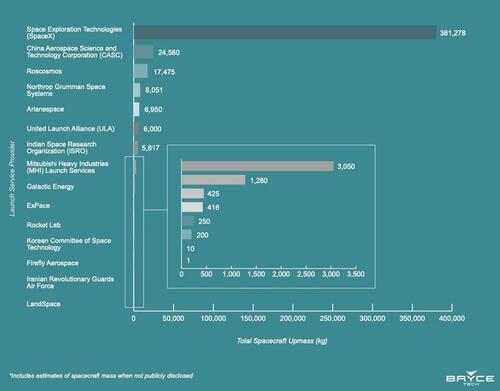FCC Rejects $900 Million Subsidy For SpaceX Amid Concerns Of Gov’t Weaponization
Elon Musk has voiced concerns that radicals within the Biden administration might attempt to ‘weaponize’ federal agencies against his businesses, citing his move to make X a ‘free speech’ social media platform. This concern was underscored in a decision by the US Federal Communications Commission on Tuesday to withhold approximately $900 million in rural broadband subsidies from SpaceX’s satellite internet unit, Starlink.
The FCC “reaffirmed” its initial decision from last year to deny SpaceX the $886 million in federal funding because it could not demonstrate program requirements, such as high-speed internet, for users in 35 states:
“After careful review, we find that the [Wireline Competition] Bureau followed Commission guidance and correctly concluded that Starlink is not reasonably capable of offering the required high-speed, low latency service throughout the areas where it won auction support,” the FCC said in a 3-2 ruling.
For SpaceX to receive funding from the FCC’s Rural Digital Opportunity Fund (RDOF), it must deliver average download speeds of over 100Mbps and upload speeds of 20Mbps to rural America by December 2025. One year ago, the FCC denied funding over Starlink’s strained satellite capacity.
“The FCC followed a careful legal, technical and policy review to determine that this applicant had failed to meet its burden,” FCC Chair Jessica Rosenworcel said.
In response to the decision, the tech blog PCMag quoted SpaceX as saying:
“This decision directly undermines the very goal of RDOF: to connect unserved and underserved Americans. Starlink is demonstrably one of the best options—likely the best option—to accomplish the goals of RDOF. Indeed, Starlink is arguably the only viable option to immediately connect many of the Americans who live and work in the rural and remote areas of the country where high-speed, low-latency internet has been unreliable, unaffordable, or completely unavailable, the very people RDOF was supposed to connect.”
Two Republican commissioners on the five-member FCC panel disagreed with the decision. They suggested the denial was due to the Biden administration’s bitterness toward Musk.
FCC Commissioner Brendan Carr warned about Biden officials weaponizing agencies against the billionaire:
“Today, the Federal Communications Commission adds itself to the growing list of administrative agencies that are taking action against Elon Musk’s businesses. I am not the first to notice a pattern here. Two months ago, The Wall Street Journal editorial board wrote that “the volume of government investigations into his businesses makes us wonder if the Biden Administration is targeting him for regulatory harassment.” 3 After all, the editorial board added, Elon Musk has become “Progressive Enemy No. 1.” Today’s decision certainly fits the Biden Administration’s pattern of regulatory harassment. Indeed, the Commission’s decision today to revoke a 2020 award of $885 million to Elon Musk’s Starlink—an award that Starlink secured after agreeing to provide high-speed Internet service to over 640,000 rural homes and businesses across 35 states—is a decision that cannot be explained by any objective application of law, facts, or policy.”
Musk chimed in on X, stating the decision “doesn’t make sense.”
“Starlink is the only company actually solving rural broadband at scale! They should arguably dissolve the program and return funds to taxpayers, but definitely not send it those who aren’t getting the job done. What actually happened is that the companies that lobbied for this massive earmark (not us) thought they would win, but instead were outperformed by Starlink, so now they’re changing the rules to prevent SpaceX from competing.”
Despite all of this, the Department of Defense recently called its nine-month pilot test of Starlink terminals in the harsh, snowy environment in the Arctic a ‘success.’
Meanwhile, SpaceX has accelerated its rocket launches to put more Starlink satellites into orbit every month. There are about nearly 5,000 of these satellites in orbit.
For comparison, Jeff Bezos’ space internet company only has a few satellites in orbit. Furthermore, Bezos had to tap Musk for rocket launches because his rocket company had been hit with severe delays.
Starlink had over two million users in September, operating across seven continents in over 60 countries.
“SpaceX continues to put more satellites into orbit every month, which should translate to even faster and more reliable service,” said Republican FCC Commissioner Nathan Simington.
Meanwhile, SpaceX has launched over 80% of the world’s payload to orbit this year. That figure will likely increase in 2024.
Musk is the leader in the space race with the most launches this year, beating entire countries like China. He also leads the space internet race.
However, with all this success, the Biden administration is terrified of the world’s richest man and has likely chosen to weaponize federal agencies against his companies. The leader of the free world should not be weaponizing the government after his opponents that jeopardize the space race for the country.
Tyler Durden
Wed, 12/13/2023 – 07:45
via ZeroHedge News https://ift.tt/XuKmnvd Tyler Durden




